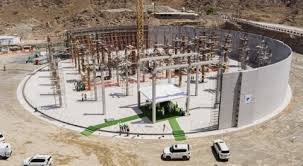After adding 700MW, the Dubai Electricity and Water Authority (DEWA) said that the total energy production capacity has increased to 14,117 megawatts (MW).
This comprises 100 MW from photovoltaic (PV) solar panels at the fifth phase of the Mohammed bin Rashid Al Maktoum Solar Park, which DEWA is implementing, and 600 MW from the Hassyan Power Complex, which uses natural gas. With a projected capacity of 5,000MW by 2030, it will be the largest single-site solar park in the world operating on the Independent Power Producer (IPP) model.
The Mohammed bin Rashid Al Maktoum Solar Park’s current PV panel production capacity has increased by 100MW from the 900MW fifth phase to 1,627MW. At the Solar Park, DEWA is carrying out additional projects totalling 1,233MW using PV and concentrated solar power (CSP).
According to Saeed Mohammed Al Tayer, MD and CEO of DEWA”We work in line with the vision of His Highness Sheikh Mohammed bin Rashid Al Maktoum, Vice President and Prime Minister of the UAE and Ruler of Dubai, to provide a cutting-edge infrastructure that helps to solidify Dubai’s position as a preferred destination for living, working, investing, and traveling,” said Saeed Mohammed Al Tayer, MD, and CEO of DEWA. Additionally, it satisfies the rising demand for water and energy services while maintaining the most significant levels of availability, dependability, efficiency, and quality.
Based on demand projections through 2031, DEWA has detailed expansion plans for the energy and water infrastructure. In order to realize the vision of Dubai’s wise leadership for a brighter and more sustainable future for future generations, we will continue to develop ground-breaking projects to diversify Dubai’s clean and renewable energy sources to incorporate all available technologies in Dubai.
Al Tayer pointed out that the percentage of clean energy in Dubai’s energy mix has reached 11.5 percent and is predicted to increase to 14 percent by the end of 2022, supporting the goals of the Dubai Clean Energy Strategy 2050 and the Dubai Net Zero Carbon Emissions Strategy 2050 to generate all of Dubai’s electricity from clean sources by the year 2050.
According to the IPP model, the Hassyan Power Complex’s current output capacity is 1,800 MW. In 2023, a further 600MW will be built. The Complex’s capacity will increase to 2,400MW as a result. The Jebel Ali Power Plant and Water Desalination Complex, one of the main foundations for supplying Dubai with electricity and water services in accordance with the highest standards of dependability, efficiency, and quality, is supplemented by the Hassyan Power Complex, which utilises natural gas. The total power generation capacity of Jebel Ali is 9,547 MW.

